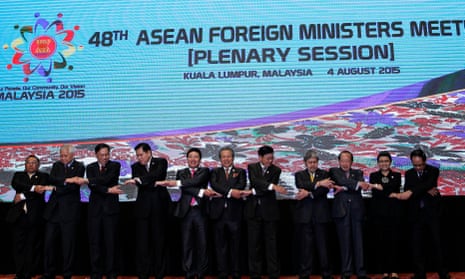Despite China’s objections, the United States and the Philippines will call for a stop to island-building work, military deployments and other aggressive actions that raise tensions in the disputed South China Sea in an annual diplomatic meeting in Malaysia, officials said Tuesday.
Beijing has opposed any mention of the thorny territorial rifts in the meetings of foreign ministers from the Association of Southeast Asian Nations and their Asian and western counterparts. But Washington has said it would call for a halt to aggressive actions by China and other rival nations to allow a diplomatic solution to a problem that threatens regional stability.
Philippines foreign secretary Albert del Rosario said on Tuesday that his country would push the US call in the meetings this week, but would not agree to be bound by it unless China and other countries locked in the conflict also do so.
“As a means of de-escalating tensions in the region, the Philippines fully supports and will proactively promote the call of the United States on the ‘three halts’ — a halt in reclamation, halt in construction and a halt in aggressive actions that could further heighten tensions,” del Rosario said.
“We have to emphasise, however, that this should not in any way legitimise the status of the features reclaimed by China,” del Rosario said, referring to massive artificial islands that China started building last year on at least seven disputed reefs.
China, the Philippines and four other governments have wrangled over ownership and control of the South China Sea, a resource-rich and busy waterway, in a conflict that has flared on and off for decades. Tensions flared last year when China began work to build artificial islands in the Spratly Islands, amid fears the actions could impede freedom of navigation and overflights in a major transit area for the world’s oil and merchandise.
Washington is not a party to the conflict and has a policy of not taking sides in the territorial row, but says a peaceful resolution of the problem and freedom of navigation in the disputed waters were in the US national interest. China rejects any US involvement.
The disputes have led to deadly confrontations between China and Vietnam, and Washington and governments in the region are concerned that boosting military deployments increase the risk of miscalculations and accidental clashes that can spiral out of control.
Chinese officials say the disputes should not be discussed in the meetings in Malaysia. Top south-east Asian diplomats will meet their US and Chinese counterparts in the Asean Regional Forum, an annual Asian security gathering, in Kuala Lumpur on Thursday.
In Washington, US State Department spokesman Mark Toner said on Monday that secretary of state John Kerry would tackle the territorial issues in Malaysia.
“This is a forum in which critical security issues need to be brought up and discussed,” Toner told reporters, adding the US would view as “provocative” any moves to “significantly increase the physical size or functionality of disputed features, or to militarise them.”

Comments (…)
Sign in or create your Guardian account to join the discussion